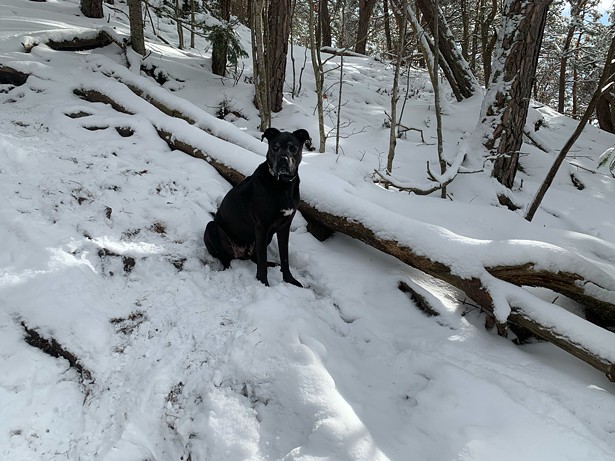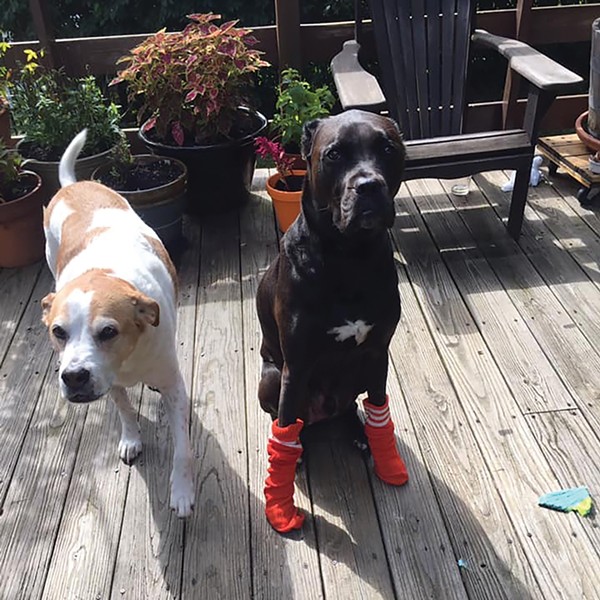
There's something about winter that seems to keep us on our toes more than other seasons. You're either looking forward to it or waiting for it but if you're a dog owner you know your pal will be by your side. We can all agree that spending some time outside, for both humans and animals, is mentally and physically beneficial. But when do the risks outweigh the benefits? A few area pet health professionals and Hudson Valley veterinarians help us know what to consider this winter when caring for our four-legged friends.
Too Cold?
"A good rule of thumb is to use common sense. If it's too cold for you, chances are your dog feels the same," says Dr. Michael Berman, lead veterinarian of the Dutchess County SPCA (DCSPCA). When it comes to the cold there's just no one right answer and just like people, some dogs fare better than others. All dogs are more vulnerable in cold temperatures and winter walks should typically be shorter, but Rhinebeck Animal Hospital veterinarian Dr. Julianne Porter, points out that "overall, it seems the majority of dogs enjoy the winter, at least for a few minutes!"According to the American Veterinary Medical Association, different breeds are naturally more prepared for winter weather conditions than others. Huskies, Alaskan Malamutes, Labrador Retrievers, and other canines with longer hair or a thicker coat of fur are built for cooler temperatures and, therefore, typically fare better physically and mentally. "Some of the shorter dogs will have trouble in high snow and some of the lean, short-haired dogs may be a little chilly. While most dogs tend to enjoy the mild temperatures of spring and autumn, they do prefer winter over summer," says Dr. Porter.
In extremely cold weather, dogs can develop frostbite and hypothermia or symptoms leading to both, and both are serious conditions. A dog suffering from frostbite will have discoloration of the extremities. "Dogs naturally have thinner tissue on their ears, tails, and paws which make these areas most susceptible to frostbite, due to decreased blood flow to these areas in cold weather," says Dr. David Gunzburg, medical director at Hurley Veterinary Hospital. Signs of frostbite can range anywhere from swelling and redness in the early stages to white, blue, and even black.
Hypothermia is an extreme reaction to wet and cold weather that can present in demeanor, breathing patterns, and even gastrointestinal complications. "A very cold or wet dog will shake or shiver and can have a rapid drop in body temperature which causes lethargy and slower breathing, says Dr. Gunzburg. "Dogs don't sweat, they pant, and so if you see your dog doing this, it could be a sign of thermal dysregulation."When you do call your dog in after spending some quality time outside, particularly on a cold day, take care when warming them up. "A common mistake we can make with our animals is to warm them up too quickly. "Instead of using hot water or extremely hot air to help warm your dog, you can gradually warm your dog using towels, blankets, or warm heat pads."
Dr. Kimberly Buchanan, Hopewell Animal Hospital owner and veterinarian, practices integrative and regenerative medicine for animals along with traditional medical techniques. She notes that, just like people, the change in seasons can cause changes to behavior or acting in ways inconsistent with typical behavior. "We always start our appointments with an observation period," she says. "This deeper diagnostic can help to address underlying causes instead of just the symptoms."
Exercise
If temperatures dip below freezing, you shouldn't be outside for very long, but regular exercise habits and routines should not be altered all that much. "Watch the weather, but keep up normal routines," says Dr. Buchanan. "Certain breeds are built for winter weather, but individual personalities do also matter when it comes to temperature preferences." Dr. Porter echoes this sentiment. "Exercise depends on the breed and life stage—a border collie is going to need more exercise than a bulldog. A puppy is going to need more exercise than a senior dog—but seniors need to get out and move too! Aim for at least 30 to 45 minutes per day, but in the winter, this may need to be shortened to 10 to 15 minutes depending on the weather. In those situations, try to find a way to exercise inside if possible."According to Jodi Arnold lead canine trainer at the DCSPCA, there is still plenty to do indoors to keep your pup from succumbing to ennui. "I struggle with winter myself, so I think more about what can be done indoors. Biologically, fulfilling a dog's brain through social enrichment exercises, nose work, and relaxation techniques can burn just as much energy as cardiovascular forms of exercise." Arnold suggests taking your dog to indoor spaces like malls to work on people training. Using brain-stimulating toys and mat training can be successful in your home. "Staying inside doesn't have to be boring, and for those who tend to steer clear of the cold, there are still many ways to keep your dog active," says Arnold.

Paw Health
Paws are perhaps the most vulnerable body part on a dog, and especially this time of year. "Over time, dogs will start to develop fissures or sores on their paws from exposure to salt and deicers on sidewalks and roads, which is extremely painful," says Dr. Gunzburg. Foot and leg injuries are also more common in the wintertime, so make sure to keep a closer eye when they wander. "Frozen lakes, ponds, slipping on ice, and even deeper snowbanks can be dangerous for dogs in terms of injury or cold weather-related illnesses," says Dr. Berman.Going to the groomer for a full cut or shave during the winter months is unadvisable, but trimming the tiny bits of hair that grow between paws can help to mitigate ice balls forming and becoming uncomfortable or painful for your pup, says Dr. Berman.
"Massaging products like Musher's salve or other petroleum jelly-based brands can help sustain paw health by applying to paws before heading outside," says Dr. Buchanan. "In any extreme, feet are important to think about and to care for, and with repeated exposure to salt, ice, and cold conditions checking your dog's paws each time you come inside is important."
When it comes to accessorizing, booties aren't just for show. According to area professionals, dog booties and covers for paws add a layer of warmth and protection from deicers and other chemicals that are often used to manage snow and ice and cause harm to paws.
You may also be wondering about other accessories and pet clothing like coats and sweaters. With the pet clothing and accessory market size valued at over $5 billion in 2021 and the recent announcement of Snoop Dogg's pet clothing company called, Snoop Doggie Dogs, are coats a necessity? According to area veterinarians, it just depends on the dog and the type of clothing. "I put a waterproof coat on my dog mostly to keep my dog dry, but they can be beneficial for smaller or thin-haired dogs," says Dr. Gunzburg. "Overall body temperature is important for a healthy dog and when dogs get wet, that can present other problems."
Upset Stomach
Although the official holiday season may be over, there's plenty still to celebrate long after the ball drops and parties continue into the new year. Your dog will be around to partake in the fun, which can also be harmful. "One of the most common ailments we treat this time of year are upset stomachs simply due to an increase in food intake, blockages, and unattended dogs looking for an extra turkey leg," says Dr. Berman. Keep an eye out for fallen holiday decorations, food, and other foreign objects that might look attractive.Avoid exposure to toxins like antifreeze or rat poison by thoroughly wiping your dog's paws when they come indoors and keeping a watchful eye for licking. "Dogs will tend to lick both salt and antifreeze, which both cause upset stomachs, but the ingestion of antifreeze can be fatal and needs immediate attention," says Dr. Buchanan. Regularly check under your car and on your driveway for potential leaks.
[image-5]Respiratory illnesses and other viruses are also common during the colder months and it's important to get a check-up if you notice sneezing, wheezing coughing, or general cold symptoms. "Just like kids in a classroom, dogs are more prone to viruses in the wintertime due to an increase in time spent inside and in closer proximity to other dogs and animals in care facilities," says Dr. Berman.
Most people associate dehydration with the "dog days of summer," but an ample amount of water to keep your dog hydrated is just as important. "Dogs need just as much water, and sometimes more, to regulate their metabolism and temperature during the winter. Indoors will be often higher in temperature and lower in humidity, so the dry air will cause more moisture to evaporate from their bodies," says Dr. Porter.
Climate Change
With climate change, ticks, fleas, mosquitoes, and other disease-carrying insects can survive for longer throughout the year. Animal hospitals and veterinarians have seen an increase in tick and heartworm issues during the colder months. "I've seen many dogs with ticks in the winter and owners are always shocked," says Dr. Porter. "Many people stop using flea, tick, and heartworm prevention during the winter. The pupal stage of fleas can survive without feeding for six to nine months. Also, unless the temperatures are below 40 Fahrenheit for several weeks, we can expect to still see ticks and mosquitoes. We will often get a warm spell in February, which will melt the snow and wake the ticks out of hibernation. Use the preventatives year-round. It is much safer and less expensive than trying to treat the diseases that fleas, ticks, and mosquitoes cause."
Keeping Track
If your dog is off-leash, Dr. Berman suggests updating any forms of identification, including microchips. "This time of year, we see an increased number of lost or stray pets at the shelter," he says. "Making sure your dog has proper tags will save you some time and heartache." The DCSPCA and Ulster County DCSPCA offer regular low-cost vaccine and microchip services, and free rabies clinics. To learn more, visit their websites.Winter can be a fun time of year for the whole family and taking a bit of time to prepare will help you reap the benefits too. If you observe your dog acting unusual, with visible ailments, or just a bit "off" seek medical assistance right away. Contact your local veterinarian or animal hospital to learn more about your specific dog and dive deeper into dog health this winter. And remember, dogs are just like us!



















